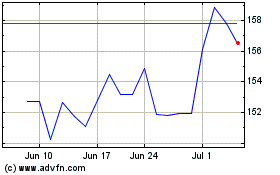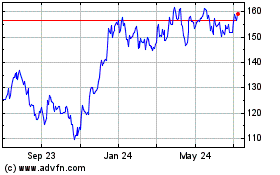Bank of America's Signal To Banks: It's Time To Repay TARP
December 03 2009 - 1:16PM
Dow Jones News
For Bank of America Corp. (BAC), repaying $45 billion to the
Treasury is a way to get the government off its back; for the rest
of the industry, it's a signal that it's time to exit the rescue
program.
Fifth Third Bancorp (FITB) and Comerica Corp. (CMA) are two
large regional banks that, analysts say, are in the best position
to follow Bank of America in repaying the burdensome capital.
Shares of both rallied in Thursday morning trading in anticipation
of such a move. Helping the stocks was a view that the Bank of
America repayment shows regulators' thinking about how much capital
banks will need to repay their Troubled Asset Relief Program
investments.
"At this time, regulators have not provided a framework for
banks of our size to repay TARP," a Comerica spokesman said. "That
being said, a top corporate priority for us is to redeem the $2.25
billion in preferred stock as such time as feasible, with careful
consideration given to the economic environment."
Wall Street also sought to quickly identify other banks that, as
research firm CreditSights Inc. put it, "may need to further
rebuild their equity cushions" until they get out of TARP. One that
can't escape the government's clutches yet, in analysts' view, is
PNC Financial Services Group Inc. (PNC). Shares of PNC and SunTrust
Banks Inc. (STI) declined Thursday morning.
A spokesman for PNC said the Pittsburgh bank "expects to redeem
TARP in a shareholder friendly manner by the end of 2010, subject
to approval by our regulators."
A SunTrust representative declined to comment. Fifth Third was
not immediately available for comment.
There has long been consensus among bankers that keeping capital
from the Treasury Department's Troubled Asset Relief Program is a
bad idea. But chief executives of some regionals, like Fifth Third
and PNC, have been reluctant to rush to dispose any capital in
times of economic trouble.
Analysts believe that if Bank of America can do it, so can Fifth
Third.
"There is pressure on all these banks to repay," said Peter
Winter, an analyst with BMO Capital Markets.
And since Treasury has agreed to let Bank of America repay, "the
government seems to be on the same page," Winter said: Banks can
now muddle through, even if the economy made a turn for the
worse.
In addition, Collins Stewart LLC's analyst Todd L. Hagerman
said, Bank of America's "TARP approval provides greater clarity on
future capital requirements for the industry and perhaps additional
evidence that the regulators believe we are getting closer to an
inflection point on credit quality."
Bank of America said its Tier 1 common capital ratio, a key
gauge of bank health, would be 8.5% after TARP repayment, an $18.8
billion capital raise and asset sales. That means Bank of America
would have around 6% Tier 1 common capital even if the adverse
scenario that was embedded in the Treasury's stress test on big
banks earlier this year came true, Winter calculated.
If that were the standard, Fifth Third and others mulling
repayment might need to raise more capital. But Winter said the
dilution to shareholders would be more than offset by the positive
impact of TARP repayment. Hagerman believed it could repay TARP
without raising more capital.
Sanford C. Bernstein & Co. LLC analyst Kevin J. St. Pierre
agrees that Fifth Third's capital is strong, but that might not be
enough. "They will still be losing money and burning capital for
the next few quarters, so I don't expect repayment until late 2010
at the earliest," he said.
Jeff Davis of FTN Equity Capital Markets Corp., meanwhile, said
in a research report Thursday morning that management at Comerica,
a commercial lender rather than a consumer bank, "will move to
redeem TARP in early 2010 provided it is comfortable with asset
quality vis-a-vis less need to build reserves."
Shares of Comerica and Fifth Third lost some of their early
luster, rising most recently 0.94% to $28.90 and 1.14% to $10.60,
respectively. The overall market is mixed, but the KBW large cap
bank index (BKX) fell 0.76%.
PNC's stock fell 4.74%, to $53.80, and SunTrust fell 1.50%, to
$22.90.
Meredith Whitney of Meredith Whitney Advisory Group initiated
coverage for Altanta's SunTrust with a "sell" rating.
-By Matthias Rieker, Dow Jones Newswires; 212-416-2471;
matthias.rieker@dowjones.com
PNC Financial Services (NYSE:PNC)
Historical Stock Chart
From Oct 2024 to Nov 2024

PNC Financial Services (NYSE:PNC)
Historical Stock Chart
From Nov 2023 to Nov 2024
